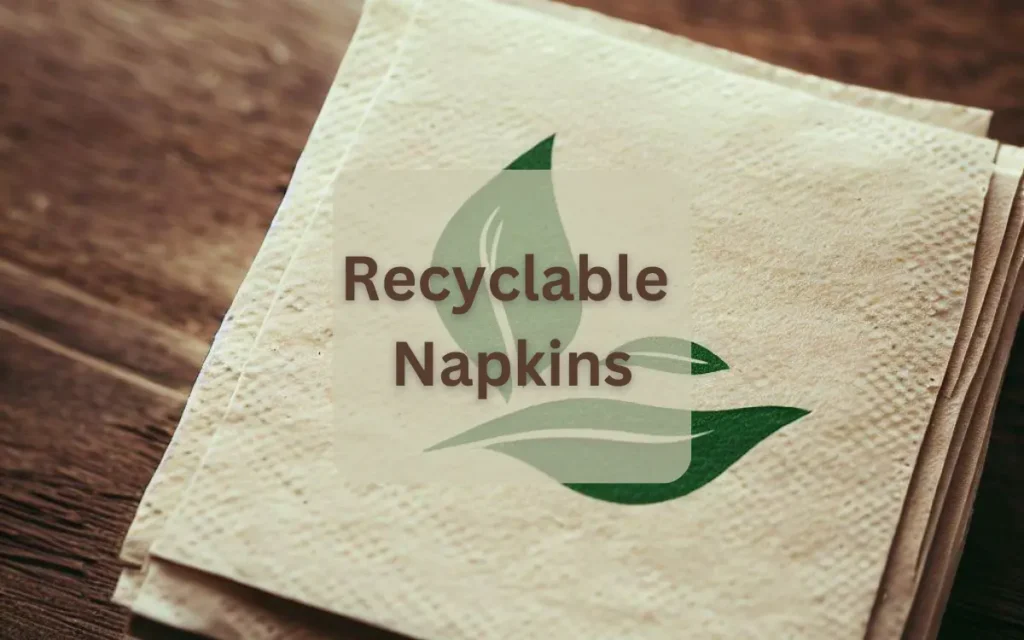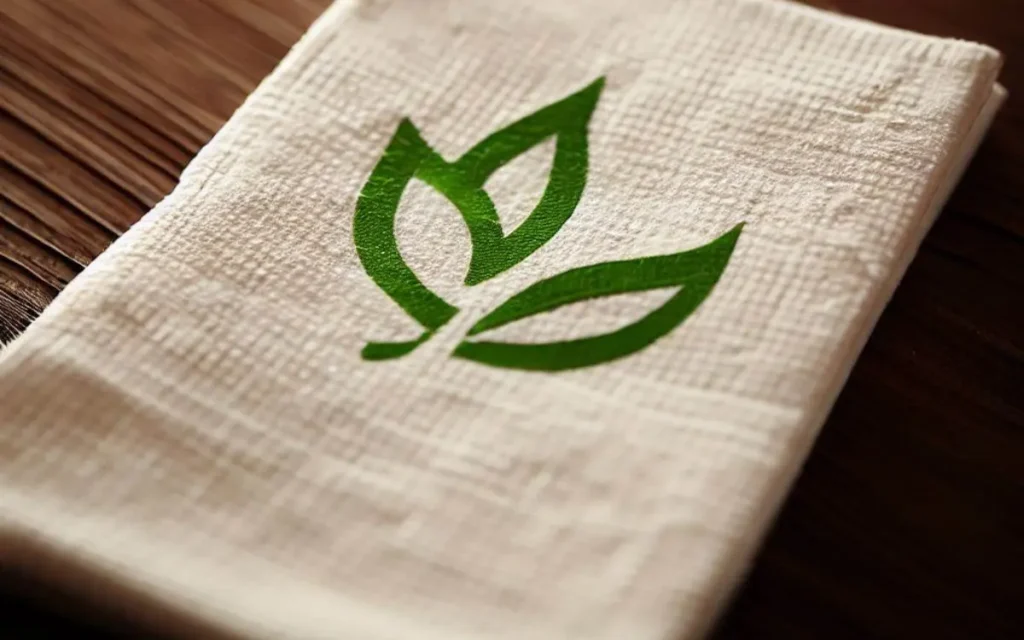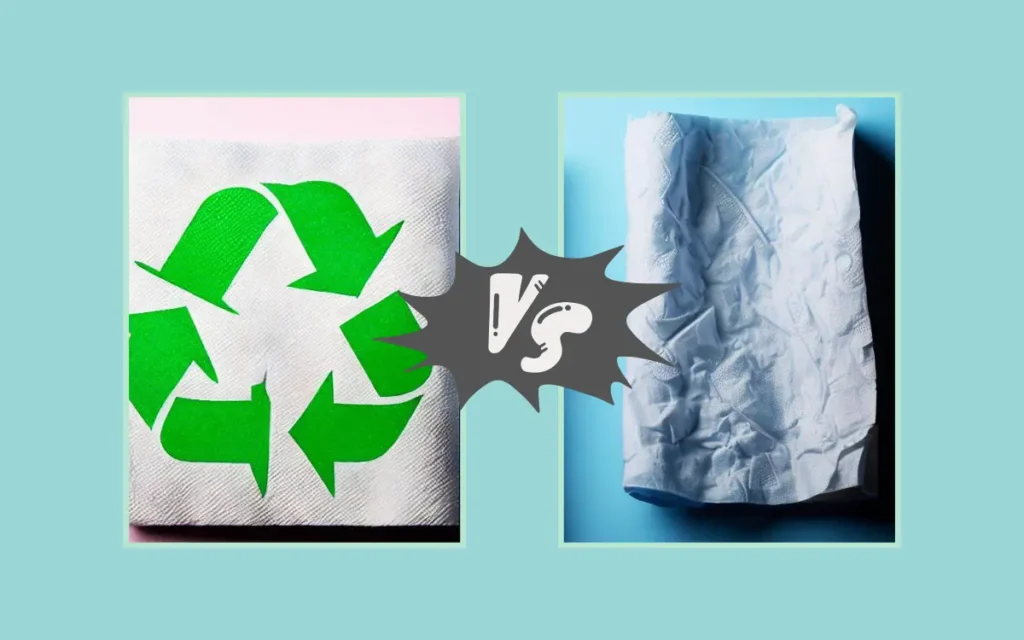
Introduction
In our journey towards sustainability, the recyclability of common items is a frequent topic of interest. Take the humble napkin, for instance. It’s there during mealtime messes and unexpected spills, quietly serving its purpose.
Yet, have you paused to think about its afterlife? Could it possibly be embodied through the process of recycling?
Well, in this article, we’ll dive deep into the world of napkin recycling.
We’ll uncover the environmental aspects and the potential paths these everyday paper products can tread upon.
By the close, you’ll be well informed to make environmentally friendly choices.
Dive in with us and learn about the fate of napkins and how each choice we make steers our world towards a brighter, greener tomorrow.
First of all, we will see are really napkins recyclable or not?
let’s see.
Are Napkins Recyclable?

Yes, but with reservations.
We all use wipes. They’re in our homes, restaurants, and at events. They help us clean our hands and deal with spills.
But can we recycle them when they’re used up?
The simple answer is yes. Napkins are paper.
So, they should be reusable. Yet, it’s not always that easy. The condition of the napkin matters a lot.
Clean and untouched wipes? They can go into the recycling bin. But if a napkin has food, oil, or other stains, things change.
Soiled wipes bring problems to the recycling process. They can add unwanted materials. This might harm the quality of recycled items. It can even break recycling machines.
So, think twice before recycling a dirty napkin. Instead, why not compost it? Many wipes, especially natural ones, are great for composting.
Differences Between Recyclable and Non-Recyclable wipes

wipes are everywhere, but they’re not all the same.
Especially in recycling.
Let’s explore the differences between recyclable and non-recyclable wipes.
Material
Many wipes are made of paper. These are often reusable. But some wipes have plastic or synthetic coatings. These can’t be recycled. The reason? These coatings mess with the recycling process. They render it challenging or downright unfeasible.
Condition
A pure paper wipes? If it’s dirty with food, oil, or grease, it’s a no-go for recycling. Such stains bring problems. They can spoil the recycling mix. And they can harm the machines. Clean wipes are the best for recycling.
Chemical Treatment
Some wipes are bleached. Others have dyes or chemicals. They might look nice, but there’s a catch. These chemicals can make them non-reusable. They interfere with recycling, resulting in poorer quality recycled products.
Thickness
Some thick wipes are fancy. But they may have multiple layers. This can make them hard to recycle. In contrast, thin, single-layer wipes are often more reusable-friendly.
Environmental Impact of Recyclable Napkins

In our quest to tread lightly on Earth, every choice counts, including the napkins we use.
But how do reusable napkins stack up in the environmental ledger?
Let’s unravel the story behind these seemingly simple items.
Resource Conservation
It is a significant perk. reusable napkins, when effectively recycled, reduce the need for raw materials.
Instead of cutting down more trees for paper, we can recycle.
This gives old napkins another chance to be useful. This means fewer forests face the axe, ensuring they continue to act as vital carbon sinks for our planet.
Energy Saving
Producing items from recycled materials usually requires less energy than starting from scratch.
So, when we recycle napkins, we’re not only saving trees but also reducing energy consumption.
This, in turn, leads to fewer greenhouse gas emissions and a smaller carbon footprint.
Waste Management
Landfills are overflowing, and space is at a premium.
Every recycled napkin saves space.
It also means less harmful methane is released. By picking and recycling these napkins, we cut down on landfill waste.
This results in a more hygienic, healthier surroundings.
Water Conservation
Manufacturing new paper products demands vast amounts of water.
However, recycling paper, including napkins, typically uses less water. Thus, supporting the recycling industry helps preserve our precious water resources.
Bottom Line
Our choices matter. The napkins we use and how we dispose of them play a role in the larger environmental picture. Being informed matters. Making eco-conscious decisions is important. We’re doing more than just talking. We’re acting for sustainability.
So, how many napkins do you think you use in a week, and what steps could you take to reduce that number for a greener tomorrow
FAQs
No, not all wipes are recyclable. Many paper wipes can be recycled. However, some have plastic or synthetic coatings. Others are treated heavily with chemicals. These types are often not fit for recycling.
Generally, grease-stained wipes cannot be recycled. Contaminants like grease can cause problems. They disrupt the recycling process. This lowers the quality of the recycled paper.
The best method is to ensure wipes are clean and free of contaminants. Place them in the paper recycling bin. If you’re uncertain about a napkin’s recyclability, check your local recycling guidelines. It’s the most reliable method to confirm.
Many paper wipes can be composted, especially if they aren’t treated with chemicals. wipes stained with food or grease. They’re better for composting than recycling.
Businesses can establish labeled recycling stations. They can offer materials that teach about recycling wipes. Partnering with local recycling agencies for awareness campaigns is also a good idea. Making recycling convenient and straightforward for customers is key.






